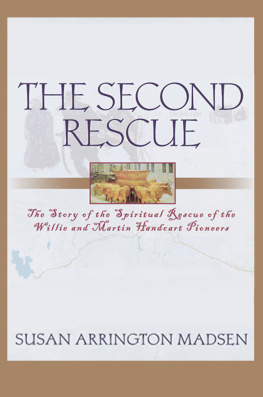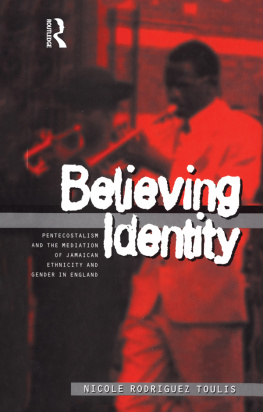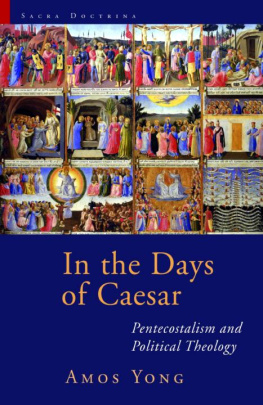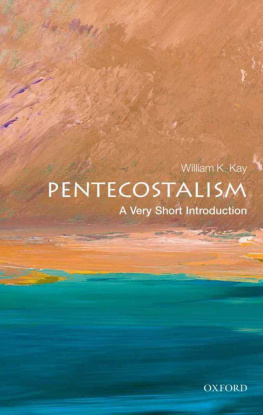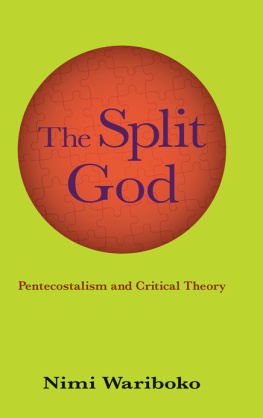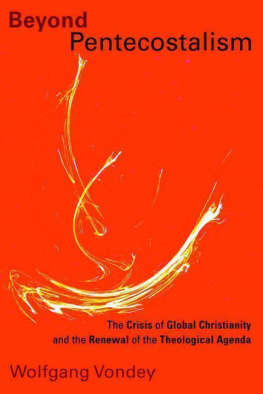Arrington French L. - Issues in contemporary Pentecostalism
Here you can read online Arrington French L. - Issues in contemporary Pentecostalism full text of the book (entire story) in english for free. Download pdf and epub, get meaning, cover and reviews about this ebook. year: 2012, publisher: Pathway Press, genre: Religion. Description of the work, (preface) as well as reviews are available. Best literature library LitArk.com created for fans of good reading and offers a wide selection of genres:
Romance novel
Science fiction
Adventure
Detective
Science
History
Home and family
Prose
Art
Politics
Computer
Non-fiction
Religion
Business
Children
Humor
Choose a favorite category and find really read worthwhile books. Enjoy immersion in the world of imagination, feel the emotions of the characters or learn something new for yourself, make an fascinating discovery.

- Book:Issues in contemporary Pentecostalism
- Author:
- Publisher:Pathway Press
- Genre:
- Year:2012
- Rating:3 / 5
- Favourites:Add to favourites
- Your mark:
- 60
- 1
- 2
- 3
- 4
- 5
Issues in contemporary Pentecostalism: summary, description and annotation
We offer to read an annotation, description, summary or preface (depends on what the author of the book "Issues in contemporary Pentecostalism" wrote himself). If you haven't found the necessary information about the book — write in the comments, we will try to find it.
Issues in contemporary Pentecostalism — read online for free the complete book (whole text) full work
Below is the text of the book, divided by pages. System saving the place of the last page read, allows you to conveniently read the book "Issues in contemporary Pentecostalism" online for free, without having to search again every time where you left off. Put a bookmark, and you can go to the page where you finished reading at any time.
Font size:
Interval:
Bookmark:
Contents


Scripture quotations marked NKJV are taken from the New King James Version . Copyright 1979, 1980, 1982, 1990, 1995, Thomas Nelson Inc., Publishers.
Scripture quotations marked KJV are taken from the King James Version of the Bible.
Scripture quotation marked GWT are taken from Gods Word , Copyright 1995, Gods Word to the Nations. Used by permission of the Baker Publishing Group.
Scripture quotations marked NLT are taken from the Holy Bible, New Living Translation , copyright 1996, 2004, 2007 by Tyndale House Foundation. Used by permission of Tyndale House Publishers, Inc., Carol Stream, Illinois 60188. All rights reserved.
Scripture quotations marked NASB are taken from the New American Standard Bible . Copyright The Lockman Foundation 1960, 1962, 1963, 1968, 1971, 1972, 1973, 1975, 1977, 1995. Used by permission.
Scripture quotations marked NIV are taken from the Holy Bible, New International Version . NIV Copyright 1973, 1978, 1984 by International Bible Society. Used by permission of Zondervan Publishing House. All rights reserved.
Scripture quotations marked RSV are taken from the Revised Standard Version of the Bible. Copyright 1946, 1952, 1971 by the Division of Christian Education of the National Council of the Churches of Christ in the USA. Used by permission.
Scripture quotations marked NJV are taken from the New Jerusalem Bible . Copyright 1985 by Darton, Longman & Todd Ltd., and Les Editions du Cerf. Used by permission
Scripture quotations marked ESV are taken from The Holy Bible, English Standard Version . Copyright 2000; 2001 by Crossway Bibles, a division of Good News Publishers. All rights reserved.
Managing Editor: Lance Colkmire
Editorial Assistant: Tammy Hatfield
Copy Editor: Esther Metaxas
Technical Design: Tammy Henkel
Cover Design: Michael McDonald
ISBN: 978-1-59684-730-9

Copyright 2012 by Pathway Press
1080 Montgomery Avenue
Cleveland, Tennessee 37311
All rights reserved. No part of this publication may be reproduced or transmitted in any form or by any means, electronic or mechanical, including photocopying, recording, or otherwise, or by any information storage or retrieval system, without the permission in writing from the publisher. Please direct inquiries to Pathway Press, 1080 Montgomery Avenue, Cleveland, TN 37311.
Visit www.pathwaypress.org for more information.
Printed in the United States of America
Introduction
The Pentecostal Movement is at a very important crossroad. There are issues to be faced which will determine if it is to be (1) a continuing force for evangelism in the world, (2) yet another movement that will be relegated to the margins by institutionalization, or (3) further divided because of a lack of holding fringe movements and questionable leaders accountable for their teachings and actions.
One thing is certain: Pentecostalism will change. As the cultures change in which Pentecostals live, change becomes a necessity if we are to reach those who need the message most. Harold Wilson noted correctly, He who rejects change is the architect of decay. The only human institution which rejects progress is the cemetery. We must not pray, God, bless what we are doing; we must cry out, God, let us do what You are blessing!
The core fivefold gospel message of Pentecostalism has remained the same for most Pentecostals: Jesus Christ is Savior, Sanctifier, Spirit-Baptizer, Healer, and Soon-Coming King (Donald W. Dayton, Theological Roots of Pentecostalism ). This message cannot change, for it is the crux of the Scriptures and Pentecostalism. However, the way this message is presented has changed in the approximately 120 years that Pentecostalism has been a force. Whether we like it or not, the average attention span for most adults in todays society is fifteen to twenty minutes. Most will not listen to a two-hour fire and brimstone sermon that was common in earlier years. Sadly, the church is no longer the center of most peoples lives. Pastors today that stand in the pulpit are often compared with glitzy televangelists, captivating motivational speakers, and engaging video presentations, not to mention megachurch pastors with seemingly unlimited budgets.
It is the goal of this book to help Pentecostal pastors and leaders address what it means to be Pentecostal and how that identity and theological perspective should affect the way we deal with issues facing the contemporary church. The authors were chosen because they have seasoned expertise in the areas they address. They represent a wide range of ministry styles and vocational contexts. All were given considerable freedom in the issues they discuss, the methodology they employ, and the conclusions they make. Some will challenge the readers theological perspectives and how those perspectives are worked out in everyday ministry, since Pentecostalism is not about systematizing theology, but rather doing theology. Others will challenge your view of ecclesiastical polity. Challenges to our preconceived notions is one of the tools that causes us to grow. As we engage the thoughts of those who challenge our own, it forces us to formalize what we believe, determine why we believe it, and seriously examine the alternative view. Most of us learn more from those who challenge us than those who think just like we do. This deep introspection results in seeking God for His view and willalways a good practice.
Unfortunately, the size of a book requires that editors and authors cannot include everything they deem important. The subjects presented here are important, but not exhaustive. There are many other issues facing the contemporary Pentecostal church that should be addressed. Every chapter has value, and to highlight each one would take away precious space that should be used addressing issues leaders face today. Let me focus on a couple of foundational chapters.
French Arringtons chapters will be of special interest to all readers. The first chapter, Pentecostal Identity and Understanding of the Bible, helps clarify who Pentecostals are among the other prominent streams of theological perspectives (Catholicism and Protestantism) and what we have to offer. Pentecostals have always been people of the Word, yet understand that experience must be taken seriously also, as the Book of Acts reveals (e.g., the Day of Pentecost, Peters vision). Arrington lays the foundation for the role of experience in our Christian journey and how our experiences are to be evaluated and informed by the Scriptures. As well, most Pentecostals have affirmed glossolalia, or speaking in tongues, as the initial evidence of baptism in the Spirit. That foundational belief is being questioned by many today. The chapter Tongues, the Evidence examines the biblical perspective for this core belief.
Pentecostalism has been a tremendous force in world evangelization. We asked Nick Park (an effective church planter / overseer in his native Ireland, active teacher / trainer in many other nations, and previous Executive Council member) to think outside-of-the-box and consider alternative ways of effectiveness in world missions. Harvey Cox ( Fire From Heaven ) concludes that Pentecostalism has been successful in world evangelization because of what he perceives as the tendency to syncretize or integrate local beliefs and customs with the Pentecostal message in a way that makes that message more acceptable to the different cultures. Park addresses this and effectively disputes that belief. He also examines our own missions methodology and offers options in an effort to promote dialogue and examination of how the Pentecostal message can continue to be effective in reaching the masses, both in the U.S. and abroad.
Font size:
Interval:
Bookmark:
Similar books «Issues in contemporary Pentecostalism»
Look at similar books to Issues in contemporary Pentecostalism. We have selected literature similar in name and meaning in the hope of providing readers with more options to find new, interesting, not yet read works.
Discussion, reviews of the book Issues in contemporary Pentecostalism and just readers' own opinions. Leave your comments, write what you think about the work, its meaning or the main characters. Specify what exactly you liked and what you didn't like, and why you think so.

